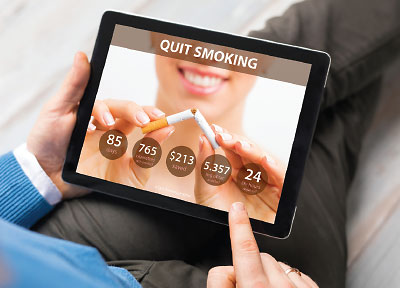Smoking Cessation App That Teaches Acceptance Shows Promise
Abstract
Smokers who used an app focused on accepting and working through urges to smoke were found to be more likely to abstain from smoking at 12 months compared with those who used an app focused on avoiding triggers of urges.

Researchers at the University of Washington have conducted one of the first rigorous head-to-head comparisons of two mobile apps for smoking cessation: iCanQuit (teaches users how to accept and work through urges to smoke) and QuitGuide (teaches users to avoid smoking triggers and distract oneself from cravings).
While both apps showed promise in encouraging users to stop smoking, the iCanQuit app—which uses tools from acceptance and commitment therapy (ACT)—was superior on several measures of abstinence over a period of 12 months.
“Beyond the head-to-head findings, this study is valuable since it elevates the field of digital behavioral health interventions,” said lead study author Jonathan Bricker, Ph.D., a clinical psychologist and professor at the Fred Hutchinson Cancer Research Center in Seattle. “These apps are serious, tested, and free options for people who need to quit [smoking].”
The clinical trial involved 2,415 adult cigarette smokers who were randomly assigned to use iCanQuit or QuitGuide for 12 months. Both apps teach users how to develop an action plan to quit, coping skills to resist urges, and provide information on all available smoking cessation medications.
The main difference is that iCanQuit—developed by Bricker and his colleagues at Fred Hutchinson—teaches smokers to accept that they will have urges and provides strategies on how to let the urges pass. QuitGuide—which was developed at the National Cancer Institute (NCI)—encourages smokers to prevent urges by avoiding high-risk situations in which cigarettes might be present and keeping their hands and mouths busy.

All the participants were sent follow-up surveys about their smoking status and satisfaction with the app at three, six, and 12 months. At all three time points, the smokers who used iCanQuit reported statistically greater cessation rates across a variety of measures. At the 12-month follow-up, for example, 28.2% of iCanQuit users reported being cigarette-free for 30 days compared with 21.1% of QuitGuide users. In addition, 23.6% of iCanQuit users reported being free of any tobacco products (such as electronic cigarettes) at 12 months compared with 16.4% of QuitGuide users.
Both apps received high user-satisfaction scores, but iCanQuit scored higher marks for engagement. At 12 months, participants opened the app an average of 37 times compared with 10 app openings for QuitGuide.
“I think this study puts forth one more valid option to try if a patient hasn’t achieved abstinence with traditional methods like avoidance,” Bricker said. “This ACT-based app strategy is still theoretical, but clinicians can offer it to patients with some degree of confidence.”
“What makes this study important is that the investigators did what they were supposed to do,” said Edwin Boudreaux, Ph.D., a professor of emergency medicine, psychiatry, and quantitative health sciences at the University of Massachusetts Medical School. “If there is an existing evidence-based treatment in a particular area, then you should compare any new approach to that standard,” said Boudreaux, who was not involved in the study.
Boudreaux told Psychiatric News that ACT has a demonstrated track record for helping patients with a range of mental health and substance use problems, so he’s not surprised that the app performed well.
Kar Hai Chu, Ph.D., an associate professor of medicine, pediatrics, and public health at the University of Pittsburgh, agreed that the abstinence results were encouraging but cautioned that the study used an older version of QuitGuide as the comparison, and the NCI app has been updated several times since then.
The question now becomes how likely smokers outside a controlled trial might be to use iCanQuit, Boudreaux noted. Research-based apps can show good engagement in a controlled trial, but “in the long run, these apps find themselves near the bottom of app searches since they don’t get a lot of good reviews or find themselves outdated quickly.”
(As one illustration, QuitGuide has around 50,000 listed installs on the Google store, whereas industry apps like QuitNow! have over 1 million.)
“Clinical investigators are not marketers or graphic designers, so they may not focus on little things like how an app looks on a 4-inch screen versus a 6-inch screen,” Chu said.
Chu, who was not involved with the current study, said he believes mobile apps can be particularly effective at helping young smokers quit. He and colleagues are taking a different approach and testing whether a popular commercially designed app (Kwit) can improve smoking abstinence in young adults if offered as part of a bedside counseling session for hospitalized patients.
Regardless of the approach, “we need collaboration between industry and academia to develop apps with true therapeutic potential,” he said.
Bricker noted that a company called 2Morrow Inc. licensed iCanQuit after the study was completed. (Bricker has no affiliation or financial interest in the company.)
Bricker’s study was published in JAMA Internal Medicine and was supported by a grant from the National Cancer Institute. ■
“Efficacy of Smartphone Applications for Smoking Cessation: A Randomized Clinical Trial” is posted here.



